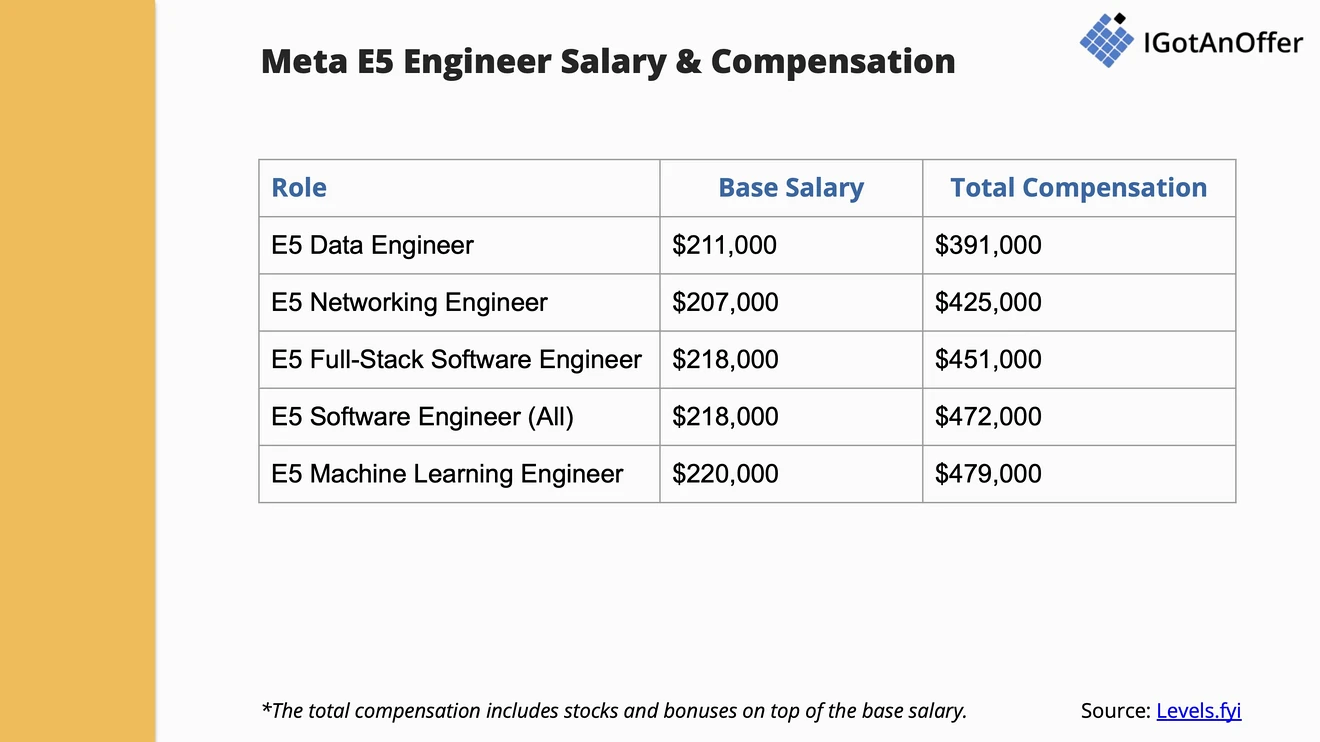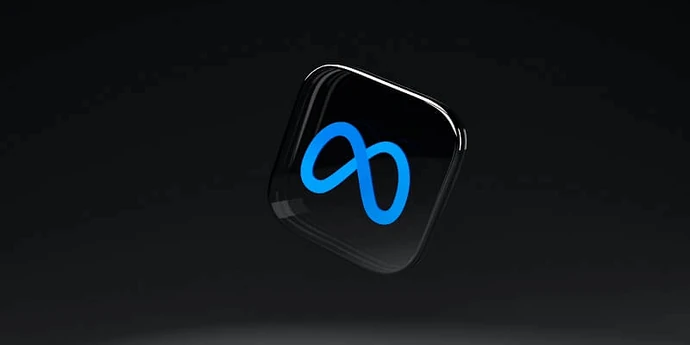Meta E5 interviews, for senior engineer candidates, are tough.
You'll need to prepare thoroughly, and we're not just talking about spending day after day on Leetcode: with 4-5 interview rounds, you'll be deeply tested on a wide range of skills.
While you’ll need to demonstrate top-notch coding skills, you have to pay special attention to system design and behavioral questions during your Meta E5 interviews.
The good news is that the right preparation can make a big difference and can help you land a job as a senior engineer at Meta. To help you get there, we’ve put together the ultimate guide below.
Note: This guide is written primarily for E5 software engineering candidates, but most of it will also be relevant if you're an E5 machine learning or data engineering candidate.
Let's go!
Click here to book a 1-on-1 session with an ex-Meta interviewer
1. Meta E5: Level and salary↑
Before we cover your Meta E5 interviews, let’s take a look at the level you're applying for.
Individual contributor levels for engineers at Meta start at E3 and go up to E9.
- E3: Entry-level engineer
- E4: Engineer
- E5: Senior engineer
- E6: Staff engineer
- E7: Senior staff engineer
- E8: Principal engineer
- E9: Distinguished engineer
Below we discuss in detail what a Meta E5 engineer does and how much engineers at this level earn on average.
1.1 What does a Meta E5 engineer do?
Luis (ex-Meta software engineering manager) describes E5 engineers as “Meta's workhorses.” At this level, he says that you need to be “very productive and own the subsystem technical direction.” Some of your responsibilities include:
- leading E3 and E4 engineers and collaborating with E6 engineers
- work on your features and support other engineers when SEVs (site events) occur
- participate in org-wide initiatives
- help streamline the developer experience and operational excellence initiatives.
According to this dev.to blog, a Meta E5 engineer owns a project or problem space end-to-end. This means you’re expected to have some experience leading a group of engineers toward a goal, as well as cross-collaboration across functions and teams.
Luis adds that your cross-functional collaboration skills should extend beyond other functions to other development teams. You’ll also need to be able to explain complex problems to non-technical teammates.
Instead of just providing coding feedback, you’re expected to help engineers in your team grow. According to Luis, you can do this either by mentoring engineers, giving training sessions, or interviewing engineers.
In this reddit post, several experienced engineers weigh in on what makes a Meta senior engineer. One behavioral aspect they agree on is having “some influence beyond your own individual work.”
This means even though you’re not expected to have company-wide impact just yet (as is expected from a Meta E6 engineer), you’ll need to demonstrate initiative to go beyond your scope as an individual contributor.
1.2 How much does a Meta E5 engineer make?
Meta's competitive salary is among the numerous factors that draw high-performing engineers to the company. Below are the average salaries and compensations for the different E5 engineers at Meta. This is based on the reported data from Levels.fyi.

Ultimately, how you do in your interviews will help determine what you’ll be offered. That’s why hiring one of our ex-Meta interview coaches can provide such a significant return on investment.
And remember, compensation packages are always negotiable, even at Meta. So, if you do get an offer, don’t be afraid to ask for more. If you need help negotiating, use our guide to Meta offer negotiations and consider booking one of our salary negotiation coaches to get expert advice.
2. Meta E5 interview process and timeline↑
2.1 What interviews to expect
What's the E5 engineer interview process and timeline at Meta? It takes four to eight weeks on average and follows these steps:
- Resume screen
- Recruiter phone screen
- Tech screen: 1 x 45-60 minute interview
- Full loop: 4 to 5 x 45-minute interviews
Let's look at each of these steps in more detail below:
2.1.1 Resume screen
First, recruiters will look at your resume and assess if your experience matches the open position. This is the most competitive step in the process, as most candidates do not make it past this stage.
You can use this software engineer resume guide to help tailor your resume to the position you’re targeting.
And if you’re looking for expert feedback, you can also get input from our team of ex-Meta/Facebook recruiters, who will cover what achievements to focus on (or ignore), how to fine-tune your bullet points, and more.
2.1.2 Recruiter phone screen
In most cases, you'll start your interview process with Meta by talking to an HR recruiter on the phone. They are looking to confirm that you've got a chance of getting the job at all, so be prepared to explain your background and why you’re a good fit at Meta.
You should expect typical behavioral and resume questions like, "Tell me about yourself" or "Why do you want to work at Meta?".
If you get past this first HR screen, the recruiter will then help schedule an initial interview with a Meta hiring manager.
One great thing about Meta is that they are very transparent about their recruiting process. Your HR contact will therefore walk you through the remaining steps in the hiring process, and will also share with you a helpful email listing resources you can use to prepare.
2.1.3 Tech screen
The next step after your recruiter call is the tech screen. This is usually conducted via video call. You can expect to be asked 2 to 3 coding questions, of medium Leetcode difficulty. Some candidates report getting a couple of behavioral questions thrown in at the end or beginning of the interview.
You'll be using CoderPad for this interview so it might be worth getting familiar with it beforehand.
2.1.4 Full loop onsite interviews
If you pass the initial interview, you’ll be invited to do the onsite, or "full loop" as Meta calls it.
The full loop interviews are the biggest test for Meta E5 candidates. During this interview loop, you'll have 4 to 5 separate 45-minute interviews with several different engineers at Meta, consisting of:
- 2-3 coding interviews
- 1 system design or product architecture interview
- 1 behavioral and retrospective interview
We'll dive into each of these interviews in Section 3.
2.2 What happens behind the scenes
Your recruiter is leading the process and taking you from one stage to the next. Here's what happens behind the scenes at each of the stages described above:
- After the initial interview, the interviewer you talked to has 24h to submit their ratings and notes on the internal system. Your recruiter then reviews the feedback, and decides to move you to the onsite/full loop interview or not, depending on how well you've done.
- After the loop, your various interviewers will make a recommendation on hiring you or not and the recruiter compiles your "packet" (interview feedback, resume, referrals, etc.) If they think you can get the job, they will present your case at the next candidate review meeting.
- Candidate review meetings are used to assess all candidates who have recently finished their interview loops and are close to getting an offer. Your packet will be analyzed and possible concerns will be discussed. Your interviewers are invited to join your candidate review meeting, but will usually only attend if there's a strong disagreement in the grades you received (e.g. 2 no hires, 2 hires). If after discussions the team still can't agree whether you should get an offer or not, you might be asked to do a follow-up interview to settle the debate. At the end of the candidate review meeting, a hire / no-hire recommendation is made for consideration by the hiring committee.
- The hiring committee includes senior leaders from across Meta. This step is usually a formality and the committee follows the recommendation of the candidate review meeting. The main focus is on fine-tuning the exact level (and therefore the compensation ) you will be offered.
It's also important to note that hiring managers and people who refer you have little influence on the overall process. They can help you get an interview at the beginning, but that's about it.
3. Meta E5 example interview questions↑
As explained in Section 2, you'll face 4 or 5 interviews at the full loop stage, lasting 45 minutes each.
Now let’s take a closer look at each question type:
We’ve provided example questions that we’ve found from our research on Glassdoor. We've categorized the questions and changed the grammar and phrasing in some places to make the questions easier to understand.
3.1 Coding
As a senior software engineer or E5 engineer at Meta, you’re expected to have robust coding skills that raise the bar for the rest of your team.
As such, expect multiple sessions of coding interviews throughout the interview process. Most Meta E5 engineer candidates report solving up to 3 problems during the tech screen, and getting up to 3 coding rounds (with 2 to 3 problems each round) for the full loop interviews.
Meta says that you will be assessed on "efficiency, structure, syntax, bugs, and working code". However, you don't need to write "production-quality syntactically perfect code". In terms of difficulty, think medium Leetcode.
You might fail to finish a coding problem (due to time constraints) and still get an offer in the end. Luis’s advice is to focus on how you communicate your ideas: “Make sure you’re not trying to "boil the ocean" or trying to impress your interviewer by trying to solve the problem in isolation. Establish rapport.”
He also says not to worry too much if you make a mistake. The important thing is to keep going and ask questions to make sure you and your interviewer are aligned on the problem scope.
As long as you can demonstrate your strong problem-solving and communication skills, you have a chance.
Here are a few coding interview questions sourced from Glassdoor’s Meta senior software engineer interview page.
Example coding questions from Meta E5 interviews
- Parse a string and do an evaluation. (Solution)
- Do an operation on an array of integers. (Solution)
- Merge two sorted arrays without using an additional data structure (one of the arrays has size N+M) Compare the compressed string and the real one for a match ex. k8s, kubernetes = true; ab100, abc = false. (Solution)
- Find local minimum in an array in log n time (ends of the array can be minimum if less than the single neighbor). (Solution)
- Find longest ascending sequence in array. (Solution)
- Shortest path in a matrix. (Solution)
- Optimize a function to find the k-th largest element in an unsorted array efficiently. (Solution)
To learn more, we recommend reviewing our Meta coding interview prep guide.
3.2 System design or product architecture
This is generally considered the hardest interview round in the Meta interview process. Depending on your exact role, you may get to choose between system design or product architecture, you may have one of each, or you may have the choice made for you!
If you’re given the chance to choose, here’s a way to distinguish between the two, according to Sidhanshu, Ex-Meta senior software engineer:
- System design interview: its purpose is to assess the candidate's ability to build software systems or end-to-end systems that solve some problem or support some end-user product. Scalability is the main concern. Apart from general system design, you’ll also want to demonstrate cloud system design skills.
- Product design interview: its focus is typically on the more holistic parts of building a software solution and less focus on the back-end components required. The overall user experience is the main priority.
Expect your interviewer to ask follow-up questions regarding various aspects of your proposed design. Talk about alternative approaches if prompted, and be prepared to go into low-level details.
Whichever of the two interviews you choose, prepare to visualize your thoughts on Excalidraw (Meta's preferred tool for this) as you discuss the questions posed by your interviewers.
Your goal is to show that you can be creative and structured at the same time. You'll be assessed less on the exact solution you build and more on the way you consider trade-offs, justify your decisions, and take a structured approach.
“You need to show you understand the problem and can work at scale with a way to calculate the impact of their decisions,” Luis says.
Note: If you're a machine learning E5 candidate, these interviews will take the form of machine learning system design interviews.
Here are some of the most common system design/product architecture questions.
Example system design/product architecture questions from Meta E5 interviews
- Design a file storage.
- Design a privacy system for Facebook.
- Design Ticketmaster (its interface should handle lots of users buying tickets at the same time; design for just one event/tickets first)
- Design an analytical metrics system which stores millions of metrics gathered from many clients and shows them on a dashboard.
Check out our guides to Meta system design and Meta product architecture interviews to learn more.
3.3 Behavioral and retrospective
Meta uses behavioral questions to test your soft skills. At E5 level, you can expect questions regarding your experience with leadership, taking initiative, cross-collaboration, conflict resolution, and handling setbacks or challenges in previous roles.
During your Meta behavioral interview, you might also be asked retrospective questions about a past project that you handled end-to-end.
For this type of question, you’ll want to demonstrate both your technical skills and soft skills. You won’t be asked to make a presentation, but be prepared to explain it visually on a whiteboard or Excalidraw. Go high-level first before going into details. Highlight how you collaborated cross-functionally, took initiative, and found opportunities to make an impact.
Example behavioral/retrospective questions from Meta E5 interviews
Behavioral
- Why are you interested in joining Meta?
- Why are you looking for a new opportunity?
- Tell me about a time you showed leadership without a leadership role.
- Tell me about the time you experienced a conflict in a project and how it was resolved.
- Tell me about a time you failed.
Retrospective
- Describe a technically challenging project where you collaborated with other teams.
- What was your role in the project?
- Did you do any technical planning or product roadmapping for it?
- How did you measure the success of your project?
- How did you handle any personal or team conflicts that arose?
For more guidance, check out our guide to Meta project retrospectives and Meta behaviorial interview questions.
4. Meta E5 interview prep↑
Now that you know what questions to expect, let's focus on how to prepare.
It's no secret that the performance bar at Meta is high. Some people even go as far as quitting their jobs to prepare for interviews full-time. This is extreme and not what we recommend doing, but it shows how much effort some candidates are ready to put in.
We've coached more than 15,000 people for interviews since 2018. Below is our four-step prep plan for Meta.
4.1 Learn about Meta’s culture
Most candidates fail to do this. But before investing tens of hours preparing for an interview at Meta, you should take some time to make sure it's actually the right company for you.
Meta is prestigious and it's therefore tempting to ignore that step completely. But in our experience, the prestige in itself won't make you happy day-to-day. It's the type of work and the people you work with that will.
If you know engineers who work at Meta or used to work there it's a good idea to talk to them to understand what the culture is like. In addition, we would recommend reading the following:
- Meta's 6 core values
- Facebook’s hacker culture (by Mark Zuckerberg, via Wired)
- Meta annual reports and strategy presentations (by Meta)
- Meta's approach to tech trends (by CB Insights)
- Meta org culture analysis (by Panmore Institute)
- Engineering at Meta
4.2 Practice by yourself
As we've outlined above, you'll have to prepare for a few different types of questions when preparing for Meta E5 interviews. In this article, we've recommended various deep-dive articles that will help you prepare for each question category. Here's the complete list.
- Coding: Meta coding interview prep
- System design: Meta system design interview
- Product design: Meta product architecture interview
- Behavioral: "Why Meta?" interview question, Meta behavioral interview questions
- Project retrospective: Guide to technical retrospectives by Tony Wu (ex-FB)
Aiming to land a Meta engineer position at a different level? Read our other Meta engineer prep guides:
Once you’re in command of the subject matter, you’ll want to practice answering questions. But by yourself, you can’t simulate thinking on your feet or the pressure of performing in front of a stranger. Plus, there are no unexpected follow-up questions and no feedback.
That’s why many candidates try to practice with friends or peers.
4.3 Practice with peers
If you have friends or peers who can do mock interviews with you, that's an option worth trying. It’s free, but be warned, you may come up against the following problems:
- It’s hard to know if the feedback you get is accurate
- They’re unlikely to have insider knowledge of interviews at your target company
- On peer platforms, people often waste your time by not showing up
For those reasons, many candidates skip peer mock interviews and go straight to mock interviews with an expert.
4.4 Practice with experienced Meta interviewers
In our experience, practicing real interviews with experts who can give you company-specific feedback makes a huge difference.
Find a Meta interview coach so you can:
- Test yourself under real interview conditions
- Get accurate feedback from a real expert
- Build your confidence
- Get company-specific insights
- Learn how to tell the right stories, better.
- Save time by focusing your preparation
Landing a job at a big tech company often results in a $50,000 per year or more increase in total compensation. In our experience, three or four coaching sessions worth ~$500 will make a significant difference in your ability to land the job. That’s an ROI of 100x!















